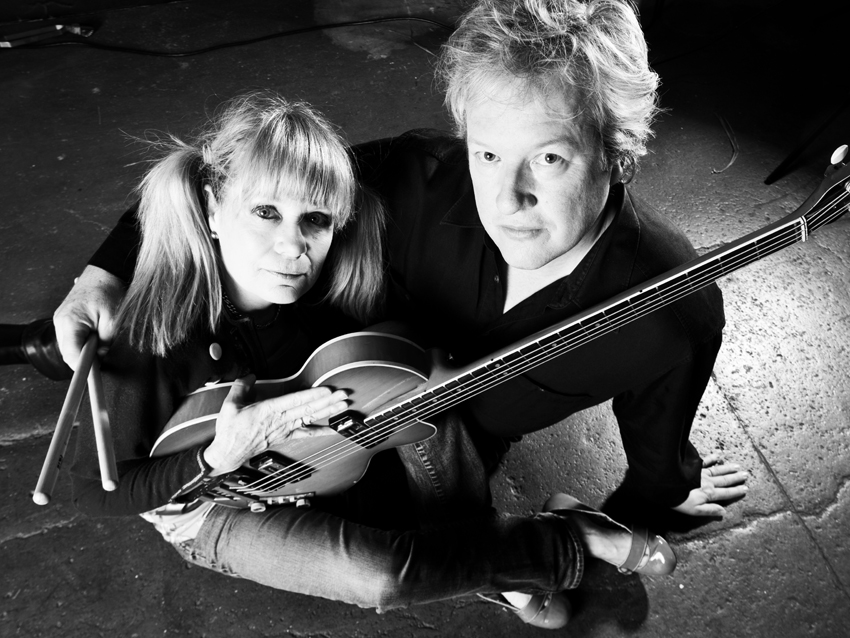
Want all the hottest music and gear news, reviews, deals, features and more, direct to your inbox? Sign up here.
You are now subscribed
Your newsletter sign-up was successful
Thirty-one years after they broke new ground by seamlessly blending disparate rhythms and genres with tracks like Genius Of Love and Wordy Rappinghood on the first Tom Tom Club album, Chris Frantz and Tina Weymouth (who also broke new ground by seamlessly blending disparate rhythms and genres as members of Talking Heads) are back with a zippy, groovy and altogether intoxicating affair, the six-track EP, Downtown Rockers.
Euro disco, P-Funk, Latin grooves, R&B - any number of parties will undoubtedly get started with the band's first studio offering in 12 years, due in large part to the Frantz/Weymouth rhythm section. The husband-and-wife team, married 35 years now, remain a dynamic, elastic, mystical and altogether inescapable presence, and the beauty of their shared technique has deepened with time.
At the emotional core of Downtown Rockers is its punchy, fuzzed-out, spaced-out, garage/art-rock title track, on which Frantz, in a variety of voices that range from coolly indifferent to mildly star-struck, name checks the groups that ruled the lower Manhattan music scene of the mid- to late '70s. Nostalgia in art can be treacherous (is there anything worse than a middle-aged rocker pining for those bad old days gone by?), and Frantz is wise to keep his tone, for the most part, vaguely detached. It's as if he's a Cultural Studies teacher narrating a slide show on a Monday morning: "The Velvet Underground... Modern Lovers... New York Dolls... Patti Smith..."
From their home in Fairfield, Connecticut, Frantz and Weymouth spoke with MusicRadar about the recording of Downtown Rockers, holidaying in France, what the '70s New York music scene was really like and whether the two ever fought about what tunes to play in the car. Frantz talked first while Weymouth finished getting dressed for an appointment. "We're a bit overscheduled today," Frantz apologized. "Right after we hang up, we've gotta run right out the door." That's how it is for downtown rockers who are also Rock And Roll Hall Of Famers.
Chris Frantz
You guys just spent the whole summer on holiday in France. That sounds like something the Stones used to do in the early '70s.
[laughs] "Well, I can assure you that our lifestyle is nothing like Keith's in the decadent '70s. Not even close. Yeah, we were gone for 10 weeks. Being back, I'm still going through my mail and trying to catch up. The part of France we go to is so beautiful, and there's a lot of family there for Tina. It's a nice switch from wherever you were before. Plus, it's such a healthy atmosphere. Even through there's a lot of wine and rich food, there's a lot of outdoor activity. You sleep well at night - it's great."
As a song and a concept, how did Downtown Rockers come about?
Want all the hottest music and gear news, reviews, deals, features and more, direct to your inbox? Sign up here.
"The reason why we wrote it is because we were going to these CBGBs events that they have once a month at Bowery Electric. One night, James Wolcott was reading from his memoir, Lucking Out - he's a great friend, and he was one of the first champions of Talking Heads. While he was reading, not just myself but another member of the band, [keyboardist] Bruce Martin, thought, You know, this is a good topic for a song. Everybody's writing books about the downtown music scene, but nobody's written a song about it. So we did.
"For us, that period in the '70s was a very exciting time. Historically, it's become more and more important as time goes on. So yeah, we wrote a song about it. It's not typical of Tom Tom Club, but you know… so what? [laughs] It's certainly a subject that's worth of our attention."
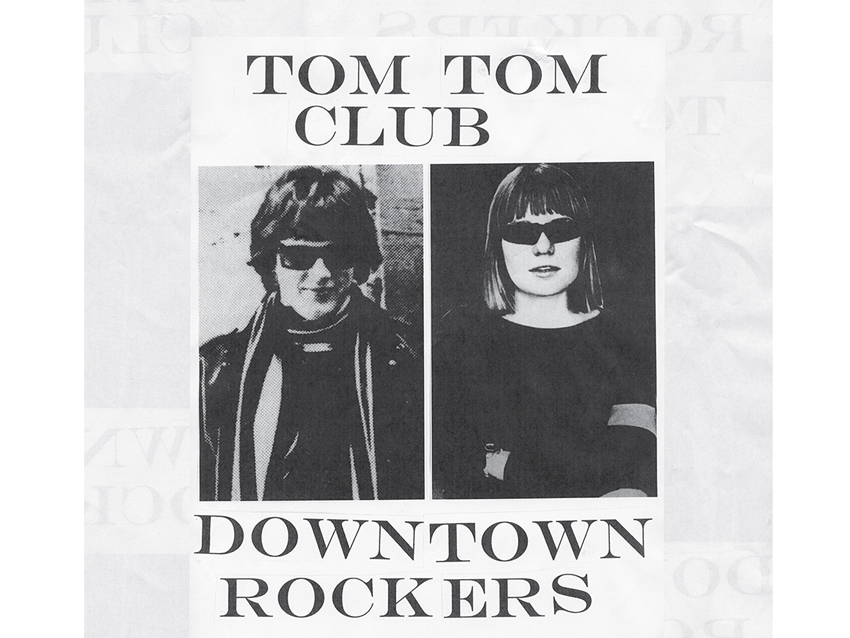
What do you remember about that time? Did you feel as though you were in the epicenter of the music world?
"Well, yes - the rock 'n' roll music world anyway. Or maybe I should say the 'new' rock 'n' roll music world. Suddenly, people started showing up at CBGB from France and Japan and the West Coast… places like Cleveland, Ohio, and Memphis, Tennessee. People just started arriving. They either wanted to write about it or photograph it or participate in it by playing. So I knew that something significant was going on. All you had to do was go to one of Patti Smith's early performances and you knew that something big and exciting was happening.
"I guess our first show as Talking Heads at CBs was in the summer of 1975. I'd already been hanging out at the place for about a year. We knew it was the right type of venue for the type of thing we wanted to do, which was different from what was going on with the Eagles and Elton John. [laughs]
"I knew it was an important place at the time. I realized that some of the bands were less historically significant than others, but all of them had the same spirit, which placed a lot of emphasis on the do-it-yourself ethic. Spirit was the main thing - not so much technical prowess. I'm not trying to indulge in nostalgia, I'm just stating the facts."
New York City will always have its bands and artists, but the mid- to late '70s seems like the last great scene to have come from Manhattan.
"I think you're right, yes. It does seem like that. Hopefully, there will be more."
When we spoke last year, you said that making albums was very stressful, hence you were opting for an EP. As the recording progressed, however, did you have second thoughts about turning it into a full album?
"Well, yes, I did, but then I realized that we're not the kind of band that churns things out, or as quickly as we used to. We're a little circumspect now, more particular. And also, being grown-up adults, we've got a lot more responsibilities than we used to have."
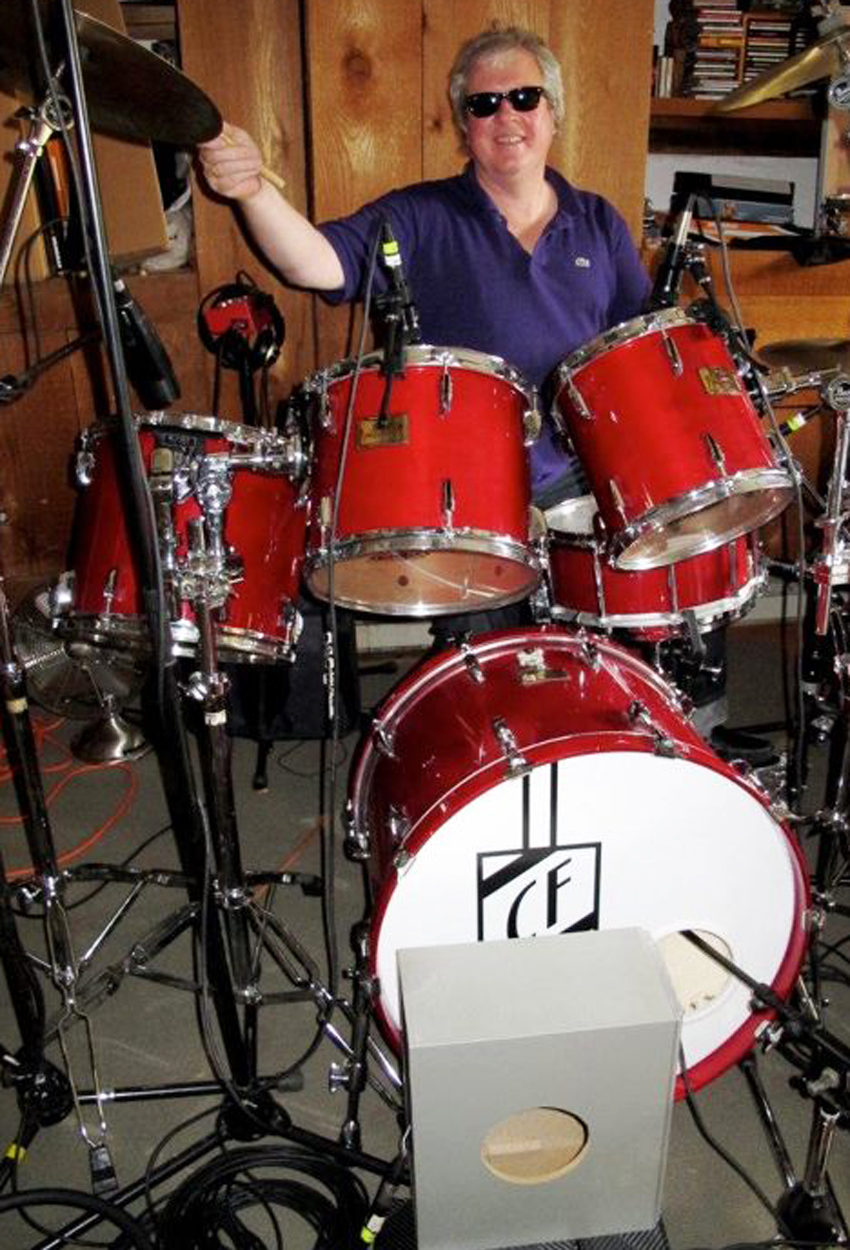
Frantz in the studio with his Pearl Masters Series kit.
You've got Poppy.
[laughs] "Absolutely! We've got Poppy. [Poppy is the couple's purebred small-sized Beagle.] But I do think that, in this modern age, an EP is plenty of music. Bob Lefsetz, for example, asked, 'Why do people even make albums anymore?' Well, I know why they make albums - because they don't know which songs are going to be hits so they put everything they can on them and see what happens. But I think an EP, with five or six songs, is plenty for people in this day and age, when they're so distracted with so much going on in their lives."
You recorded the EP in your home studio. At any point did you think about jetting off to some tropical paradise studio like you did back in the day?
"That would have been very nice. One reason why we built this studio, though, was that we couldn't afford the rates at the beautiful tropical studios, which unfortunately no longer exist. The great thing about having your own studio is that you don't have to go to a record company with your hat in your hand to get financing. You just get going whenever you want."
You've said that the songs were born from jams. Being that you and Tina are married, don't you guys ever sit down together and record bits of ideas?
"I guess we could, but I find that we're more productive if we create a deadline for ourselves and stick to it; otherwise, you can drag things out for long periods of time. As far as jamming - Tina being a bass player, me being a drummer - we're not into so much the bass player/drummer jams; we like to have some other instruments to play off of. So our touring band, Bruce Martin and [guitarist] Pablo Martin, were fantastic. I'm so happy to be working with them."
With the song Downtown Rockers, you name check so many bands from New York '70s music scene. Were you worried that you'd leave anybody out?
"There were a few people that I thought I should mention, but I didn't. There just wasn't enough time in the song! [laughs] But I think I got the prime movers in there."
Tina Weymouth
Every recording offers a band some sort of new learning curve. What did you - or you and Chris - discover while making Downtown Rockers?
"Oh, it was a lot. We worked fast, jamming for a couple of days and then recording. I sort of took over the engineering to keep things cheap. [laughs] Seriously, that's why we have a home studio. There was a large learning curve for me there because it was the first time we were using the studio for Tom Tom Club.
"At the same time, the record was a real return to our sources, our roots. Even my father said to me, 'You're known as an innovator. You should be innovating.' And that got to be so intimidating that we said, 'Wait a minute. What are we innovating from?'
"Chris had bought two incredible DVDs about the Stax story, and it was amazing to watch those guys playing live in Sweden, stuff we never saw on American television, ever. To watch Booker T & the MGs, Sam & Dave, it was a real return to realizing it all and saying, 'Now, this is exciting!' [laughs] So we were watching that before we recorded, before we jammed. Chris set these little markers: 'Let's do something with a beat like this,' and 'Let's do something with a beat like that.'
"Everybody would kind of jam on these ideas. He would say, 'Let's do a boogaloo!' But, of course, it wouldn't come out as a boogaloo exactly, so there were a lot of surprise elements. We weren't trying to imitate, we were trying to be inspired by the music we were listening to."
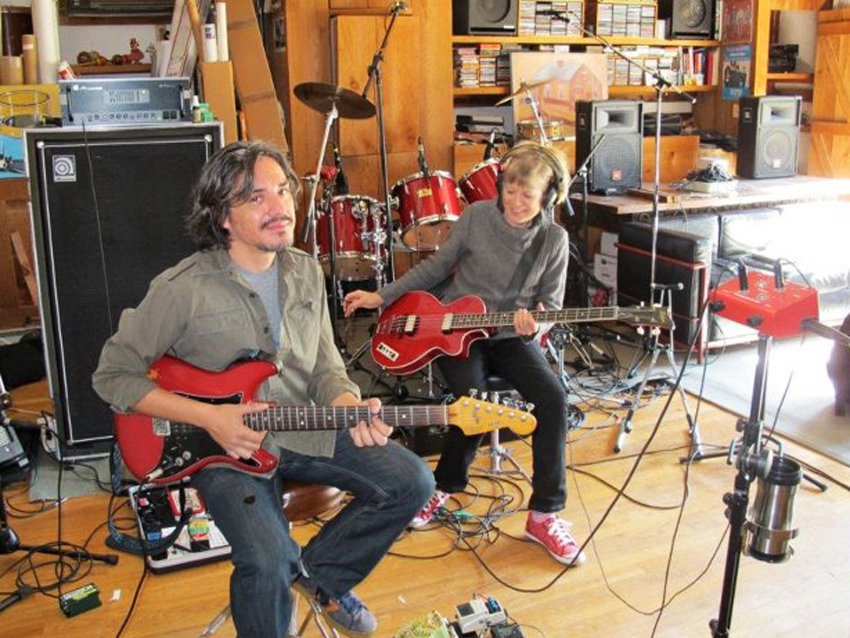
Weymouth shares a lighthearted moment with guitarist Pablo Martin. © Chris Frantz
It's often said that a drummer and bass player have to be "married" to form a great rhythm section. But you and Chris actually are husband and wife! [Tina laughs] Does either one lead?
"The drums always lead. The drums work the band. A bass player follows the drummer - always. It doesn't matter what band you're in. You can't do it any other way. I mean, Tricky tries to do it a different way, but Tricky's Tricky. He is exactly what he says he is - he doesn't do music, he does image.
"I mean, look at Ringo Starr. George Martin told The Beatles, 'You're great, but you've got to get another drummer. You've got to get a real drummer.' And Ringo Starr was the real drummer. He kept a very lighthearted, humorous repartee going, but he worked that band. He was an artist. So yes, it's always a chemistry that starts with the drums."
You do a wonderful cover of The Pinker Tones' Love Tape. There's a line in the song, "I'm going to make a tape for your car." I'm curious, when you and Chris are taking a long car trip, what music do you violently disagree on?
[laughs] "That's a good one. I don't know if there's any music that we violently disagree on and can't play for each other. But you know, if you really want tick Chris off, play Tie A Yellow Ribbon or Bad, Bad Leroy Brown. Actually, play anything by Jim Croce, and you'll put the happiest man in the world in a really foul mood. [laughs] He'll turn completely sour.
"But we pretty much agree - that's why we're together. We met at art school as painters, and we agreed that we can disagree. But we also share an aesthetic, and it's both musical and visual."
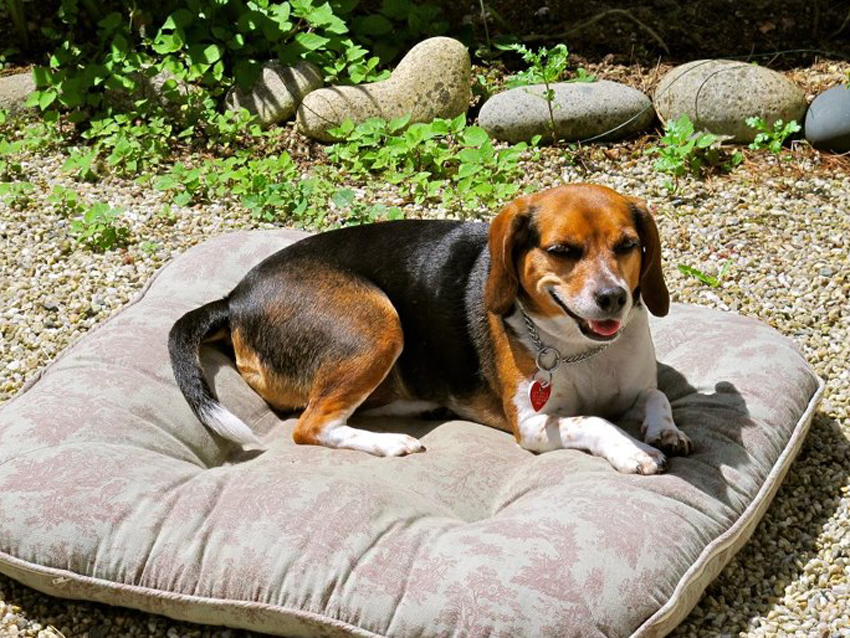
Poppy, world-famous canine internet celebrity, sunbathing in France. © Chris Frantz
Some of the new songs have really great guitar parts -
"That's Pablo. He's a bass player, but he learned to play guitar off of Talking Heads songs. So you've got bass parts on top of guitar parts. It's very Tom Tom."
I hear a little bit of the B-52s' late guitarist Ricky Wilson in his playing.
"Yes, there is that, sure. There is one song that we did say where we said, 'Hey, that's very B-52s-ish."
Kissin' Antonio is the one where I really heard it.
"Yes, definitely. You know, Tom Tom Club were all inspired by the B-52s. We met them in 1978 in Georgia at an after-party, after Talking Heads played with Elvis Costello opening. We thought they were great. We told them, 'Come on up, we'll get you a gig at CBGBs. We'll put in a good word with Hilly Kristal.' Tom Tom Club were always inspired by dance music, without slavishly imitating."
During the jams and recording sessions, how much free reign did Pablo and Bruce have to contribute?
"They had complete free reign. Every time we soundchecked on tour, we'd have little jams. I wish I had tapes, but they weren't recorded, and we didn't remember them. So it was whatever came to us on that day. It's kind of like cooking." [laughs]
Whenever people talk about great female bass players, they usually say one name: Carol Kaye. Do you feel that you're properly acknowledged?
"And I should say that, yes, Carol Kaye is the great female bass player. As for myself… I think it's fine. I've won awards. [laughs] I don't feel like I've been ignored. You know there was a time in the late '80s and early '90s when male guitarists would turn to their girlfriends and say, 'Hey, pick up the bass. Play like Tina Weymouth.' That was probably very annoying to them to be compared to me.
"Even Bono told me that Adam Clayton tried to imitate me. But I was learning from the records that James Jamerson played on, so I was assimilating his style, along with Donald 'Duck' Dunn from Booker T. So… I don't worry. I get my due."
What kinds of basses are you playing these days?
"I'm playing a Hofner Club. I don't want to take my old '60s Club Bass on tour, so I have a new one, and it's very well made. It's got all the parts and beautiful tone - fat, deep end. The only difference from the '60s one is that it has a soundblock to keep it from feeding back, which is actually good - you don't want your bass feeding back. Maybe at the end of Psycho Killer, but that's about it." [laughs]
What kind of amps and effects do you use?
"I use an Ampeg Classic, but you know, they make really good ones now that are much smaller. Sometimes I use effects, but it depends on my mood. If we're going to Europe, it can be so difficult to get those things past the TSA - it's just impossible. I do use effects sometimes, but on this record I didn't. I keep it simple. Simple is always better."
Joe is a freelance journalist who has, over the past few decades, interviewed hundreds of guitarists for Guitar World, Guitar Player, MusicRadar and Classic Rock. He is also a former editor of Guitar World, contributing writer for Guitar Aficionado and VP of A&R for Island Records. He’s an enthusiastic guitarist, but he’s nowhere near the likes of the people he interviews. Surprisingly, his skills are more suited to the drums. If you need a drummer for your Beatles tribute band, look him up.
